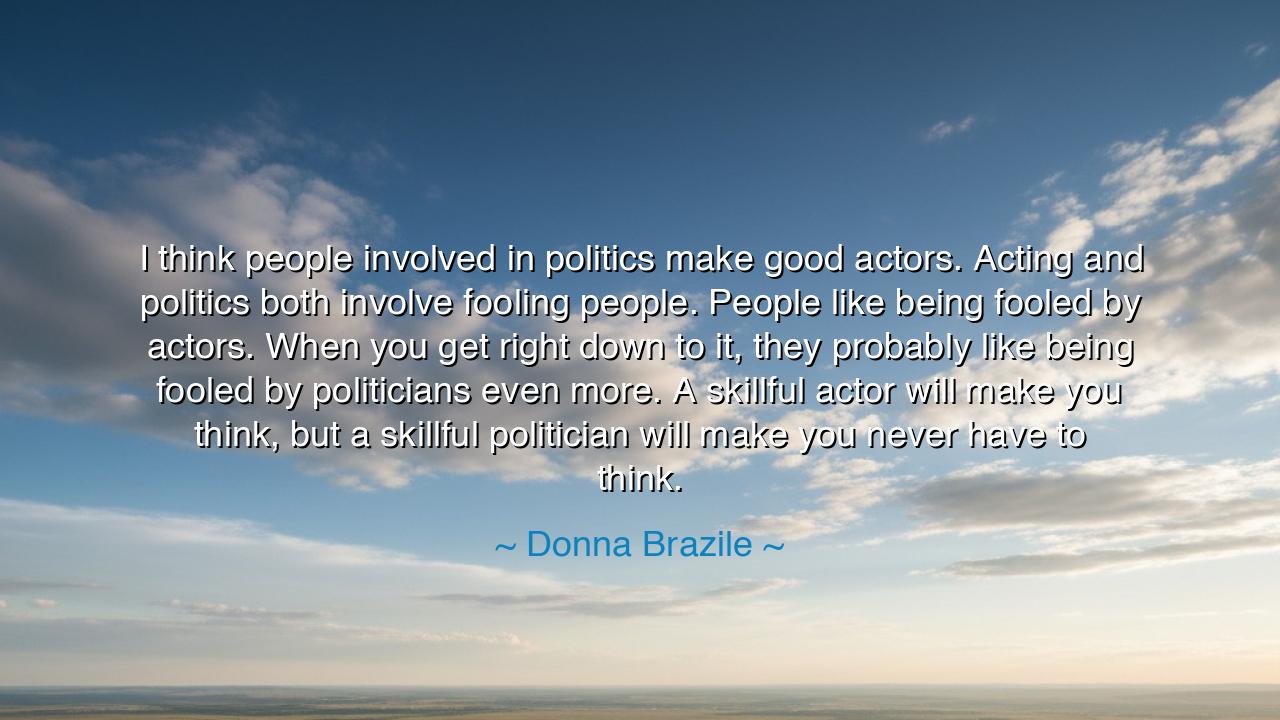
I think people involved in politics make good actors. Acting and
I think people involved in politics make good actors. Acting and politics both involve fooling people. People like being fooled by actors. When you get right down to it, they probably like being fooled by politicians even more. A skillful actor will make you think, but a skillful politician will make you never have to think.






When Donna Brazile declared, “I think people involved in politics make good actors. Acting and politics both involve fooling people. People like being fooled by actors. When you get right down to it, they probably like being fooled by politicians even more. A skillful actor will make you think, but a skillful politician will make you never have to think,” she unveiled a truth as old as the empires: that the stage of politics is but another theatre, and its performers, though clad in authority, are masters of illusion. For both acting and politics rest upon the art of appearances, yet the danger lies in this—where the actor’s deceit is meant to inspire, the politician’s deceit is meant to control.
The ancients themselves understood this duality. Plato in his Republic warned of the “noble lie,” the falsehood told by rulers to bind the people together. Even in Athens, the birthplace of democracy, leaders swayed crowds with spectacle, knowing that the heart is moved more swiftly than the mind. So it is that Brazile observes: the actor leads us into thought, reflection, and catharsis; the politician, if cunning, lulls us into forgetting, into surrendering our vigilance.
History offers sobering proof. Consider the rise of Julius Caesar. With words and presence, he captivated Rome, playing the role of savior while quietly dismantling the Republic. The people adored the performance and, desiring ease over vigilance, gave him their trust. Like spectators at a grand drama, they were carried by his charisma, forgetting to question until freedom itself slipped away. Here, the truth of Brazile’s words becomes clear: the more skillful the politician, the less the people feel the burden to think.
Yet her insight is not only condemnation—it is also warning. To recognize the fooling is to arm oneself against it. For though people delight in the illusions of the actor, they must not surrender so willingly to the illusions of the statesman. The actor leaves us freer, enriched by imagination; the politician, unchecked, binds us with unseen chains. Brazile’s words call upon us to demand more than performance from those who govern.
Let this teaching endure: enjoy the illusions of art, but guard against the illusions of power. For the stage is meant for stories, but the state is meant for truth. When politics becomes only performance, and the people surrender their duty to think, then the republic becomes no more than an audience, and its rulers no more than actors wearing crowns. To resist this fate, let each citizen learn to see through the mask, and to demand substance where once they settled for spectacle.






BNLai Bui Bao Ngoc
Donna Brazile’s quote suggests that politics can be about manipulation, but does this undermine the possibility for politics to be a force for good? Is it possible for politicians to engage people without resorting to manipulation, or does politics always involve some level of persuasion? How do we, as the public, become more discerning in evaluating political leaders and their intentions? Is it our responsibility to hold them accountable for their actions and rhetoric?
HPNGUYEN THI HONG PHUONG
The comparison between acting and politics in this quote is interesting, but it feels a bit harsh. Is there a line between effective political communication and deception? Could it be that politicians are simply doing what’s needed to connect with their audience, similar to how actors engage with viewers? What happens when that connection turns into manipulation? How do we ensure that politicians use their persuasive skills responsibly and ethically?
TPNguyen Thien Phuc
Donna Brazile’s words about actors and politicians being similar in the way they engage people’s emotions and attention are sharp. But is it really the case that people ‘like being fooled’ in politics? Don’t we, as voters, often crave authenticity and transparency? What does it say about the political climate when such a cynical view is so readily accepted? Could the public’s willingness to be ‘fooled’ reflect a deeper trust issue in political institutions?
ATLe Ngoc Anh Truc
This quote makes me wonder if politics is becoming more about the spectacle than the substance. The idea that people ‘like being fooled’ seems concerning, as it suggests that many might not be critically engaging with political issues. How do we, as citizens, change that dynamic? Is it possible to demand more transparency and honesty in politics, or is the ‘performance’ aspect always going to be part of the game?
LPAnh Le Phuong
I get the point Donna Brazile is making, but I wonder if this comparison might be a bit too cynical. Yes, politics can sometimes feel like a performance, but is it possible that politics is more about persuasion and communication rather than fooling people? Aren’t there political leaders who use their skills to raise awareness and motivate positive action? How do we distinguish between manipulative behavior and effective leadership?